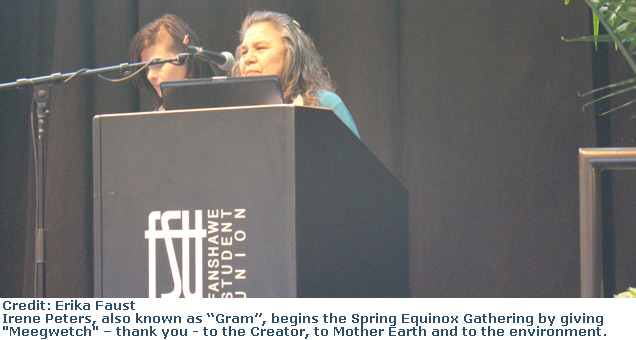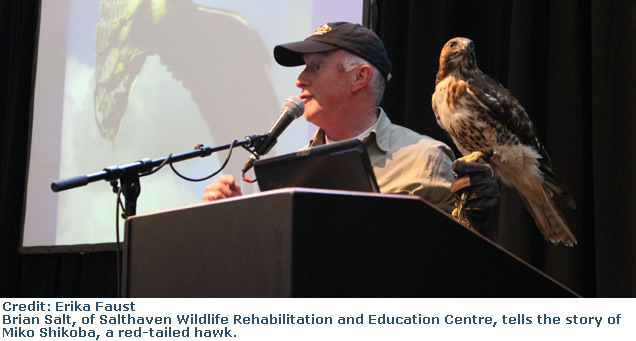New First Nations Studies program seeks community input

The Spring Equinox Gathering, put together by faculty in Fanshawe's First Nations Centre, celebrated more than the coming of a new season; it gave community members a chance to collaborate on the new First Nations Studies program at Fanshawe.
“It's sort of like a feast, a gathering, raising further awareness and getting some feedback in terms of the program development and just opening up that doorway, as it is very community-centred program,” explained Andrew Judge, an Instructor of First Nations Studies at Fanshawe and one of two Curriculum Coordinators and Advisors for the new program. “That's just one way of bringing the community together. It's a very exciting opportunity for all involved.”
The dozens of community members, Elders, Fanshawe and University of Western Ontario staff in attendance gave their input as to when themes — such as creation stories, medicine and holistic lifestyles, traditional governance structures of local Indigenous groups, traditional ceremonies and more — should be taught during the 14-week program.
“We're really looking forward to trying to shape our curriculum around the needs of the community,” explained Steve Patterson, a Program Manager in Fanshawe's School of Language and Liberal Studies.
The new program, which will be a wing of the General Arts and Sciences department, will enable “First Nations and non-First Nations students to engage in First Nations education in order to assist them and to progress into further post-secondary studies or another area in the College,” explained Judge. An opportunity the program organizers are working on is an articulation agreement with Western that would allow students in their second year of the program to take up to five university-level credits and start second-year university in their third year of post-secondary education.
The program has been in the works since early September 2011, when Judge was asked to build a diploma program in First Nations Studies. As part of his research, he met with 26 community members that included Fanshawe students, Western professors, Elders, medicine people and youth. “That work was instrumental in building a vision,” he said. In talking with community members, he noted that most of them said the same thing: “There were two streams or areas that we needed to focus on: contemporary knowledge and traditional knowledge.”
“We're going to focus on Chippewa, Munsee and Oneida. We're going to focus on those three communities because they're the closest, and then we're going to branch outwards to the local First Nations,” Judge explained. He and Jess Ford, the other Curriculum Coordinator and Advisor for the new program, met with five chiefs and plan to meet four more in the southwestern Ontario region. “We're doing as much as we can to ensure that the community voice is heard, and that's why we brought everybody here (on April 17).”

Part of the Gathering included a talk from Brian Salt, of Salthaven Wildlife Rehabilitation and Education Centre in Mount Brydges, just outside of London. He captivated the audience for over half an hour, sharing stories of the wild birds, raccoons, turtles and more that the volunteers at Salthaven had rehabilitated and released back into the wild. His presentation also included a guest: Miko Shikoba (which he explained means “red feather”), a red-tailed hawk currently living at Salthaven.
Last summer, said Salt, 93 volunteers worked three shifts every day from April to September, accumulating over 7,000 hours of volunteer time. The volunteers worked with over 780 wild birds and animals, and out of those, 487 were released back into the environment and given a second chance at living wild and free, he said. “(The volunteers) work with their hearts as well as their hands. This is a work of love as much as anything else.”
In response to an audience member's question about how to get involved as a volunteer at Salthaven, Salt explained, “Anybody from First Nations — we will take you as volunteers any time. You have a vested interest in these animals, and we recognize that. These are not our animals, they're yours. We want you to be associated with them and to help them and to work with them. It's an open-door policy for anybody in First Nations.”
For more information about Salthaven, visit salthaven.org.













